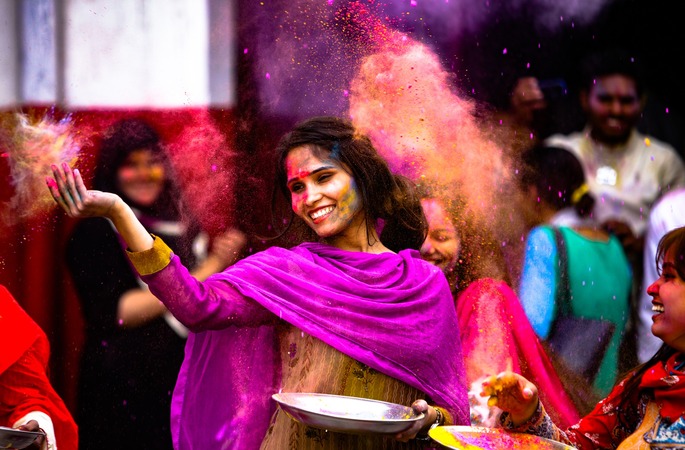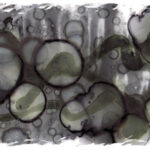In South India, the god Shiva – that volatile destroyer dancing in a hoop of flames – reigns supreme. Just about every man wears his mark on their forehead – a slash of white and vermillion; and just about every temple is guarded by his vehicle, Nandi, the bull. Shiva (the Destroyer) is one of the trinity of Hinduism – Brahma the Creator and Vishnu the Preserver being the other two major Hindu deities.
In the Brihadeshvara temple in Thanjavur, Tamil Nadu, we are guided by a gracious gentleman into a shadowed and hallowed inner sanctum to view the largest Shiva lingam in the world. The lingam is a phallus symbol – a huge dome of smooth black rock lit by hundreds of oil wicks. Only Brahmin priests are allowed in its immediate vicinity.
Every day this gigantic stone is washed in saffron and milk and massaged with perfumed oil. Our guide tells us about all this in hushed tones. I try to appear interested, but
I am distracted by the vivid women who frolic and caper on the temple walls. They beckon me with their eyes and hands: these curvy, coy, angelic, fierce, coquettish women, gesturing and dancing on ancient stone.
And all around us are their living counterparts with babies on their hips and pots on their heads, sitting on the dusty ground of markets and roadsides, chatting at the village well, riding on motorbikes, herding goats, washing clothes in rivers, weaving garlands, grinding spices, cooking food.
In fields of mustard, lentils, rice and tea there are women – bending to the earth, picking leaves, fetching water, harvesting grain. They flash and shimmer in luminous colours – crimson, lime, peacock blue, deep pink, saffron, emerald and marigold. The vibrant certainty of their clothing, the clink of bangles, glint of toe rings, the jingle of anklets and the sound of their voices pattern the landscape of India.
Each night we listen in amazement to articulate and strong words by female journalists, politicians, feminists and writers on NDTV. Our favourite personality is Barkha Dutt – an Indian television journalist and columnist who astonishes us with her incisive analysis and beautifully spoken English.
Another courageous and astute author and columnist is Tavleen Singh. These women and many others are forceful and brilliant communicators, and they are not afraid to tell difficult stories. Yet everywhere we hear other stories. Stories which keep ordinary women in their place. Stories like the one below which was told to us by our intelligent female guide, Miru, at Kapaleeshwara Temple in Chennai.
In this temple, Parvati, Shiva’s wife, was condemned to live for years as a peahen because she got distracted and bored by her husband’s tedious explanation of the mantra ‘Om’. After many years of repentance and prayer, the peahen finally found Shiva and offered him flowers that she carried in her beak. Shiva then appeared to Parvati and reunited with her.
Miru and I laughed at this tale of a hot-tempered, bombastic husband enjoying the sound of his own voice and irritated at his wife’s lack of attentiveness, but how many women live like peahens bringing flowers in their mouths to angry and dangerous men.
The women of India are the most dazzling and robust threads in the splendid and startling tapestry of this country. Sweet-faced Parvatis, fish-eyed Meenakshis, Radhas and Lakshmis with painted hands, nose studs and kohl-dark eyes lighting incense and burning oil lamps in front of male gods.
After hearing Miru’s story, I scribble a response from Parvati to Shiva in my notebook:
Your long-winded explanation of ‘Om’ fills my mouth with yawns. Your voice goes on and on and to keep myself from blinking I reach out to my peacock with its sapphire tail and certain strut.
Your anger fills the air like a thunderclap, and I am condemned to wander the courtyards and pavilions of this temple as a shabby peahen with downcast eyes. There is a strange joy in this peaceful temple life, but I know that you will return when you have cooled down.
You will take the flowers from my beak and turn me back into Parvati, your wife, but when will you lose your temper again?



